



World Wide Words Differences Between American and British English By Kenneth Beare While there are certainly many more varieties of English, American English and British English are the two varieties that are taught in most ESL/EFL programs. Generally, it is agreed that no one version is "correct" however, there are certainly preferences in use. The three major differences between between American and British English are: Pronunciation - differences in both vowel and consonants, as well as stress and intonation Vocabulary - differences in nouns and verbs, especially phrasal verb usage Spelling - differences are generally found in certain prefix and suffix forms The most important rule of thumb is to try to be consistent in your usage. Use of the Present Perfect continue reading below our video Loaded: 0% Progress: 0% In British English the present perfect is used to express an action that has occurred in the recent past that has an effect on the present moment. I've lost my key. In British English the above would be considered incorrect. British English:
Sounds: The Pronunciation App Practise, practise, practise! Work how you want to work – practise listening, reading, speaking and writing. Interactive phonemic chart Tap on a symbol to hear the sound, or tap and hold to hear an example word. Look up and listen to over 650 words in the Wordlist, then record and compare your own pronunciation. British Slang If you’re planning on visiting London in the future, you might just want to familiarise yourself with some British Slang expressions that are very commonly used by the British. They will be very useful particularly if you’re likely to be socialising with Londoners. 1. This famous expression is always used on trains and the London Underground (Tube). 2. “Mate” is British Slang used to refer to men. 3. If something is “naff”, it is very uncool. 4. This British Slang word is not to be confused with the film of the same title where the main characters removed all their clothes for a striptease act. 5. The literal meaning is larva, but it is also another word for food. 6. “I love Pringle Crisps. 7. When the English don’t like something, but don’t want to be rude they will say: ” I’m afraid that going to nightclubs is not my cup of tea”. 8. This is another British slang word for the UK currency, the pound. 9. 10. This basically means ‘thank you’. If you enjoyed this post, please share it. Shanthi
Diction Exercises - Tongue Twisters to Learn How to Speak Clearly - articulation drills to make sure they get your message Why should you do diction exercises? Because your speech content may be great, you may look fantastic but unless your audience can UNDERSTAND what you're saying, your message is lost. 697Save Diction exercises will help you learn how to speak clearly. These drills are the speaker's warm-up equivalent. The benefits of diction/articulation exercises or drills are: strengthening and stretching the muscles involved in speech bringing to your attention habitual speech patterns which may be less than perfect. Good diction is NOT about changing your accent or making you 'talk posh'. The most commonly known and used diction exercises are Tongue Twisters. There are literally squillions of them, each focusing on either a single letter, or a letter combination. Tongue twisters have long been an integral part of a public speaker's tool kit. Diction Exercises: Tips & Tongue Twisters Diction Exercises for 'B' words: Bill had a billboard. For 'Q' words: